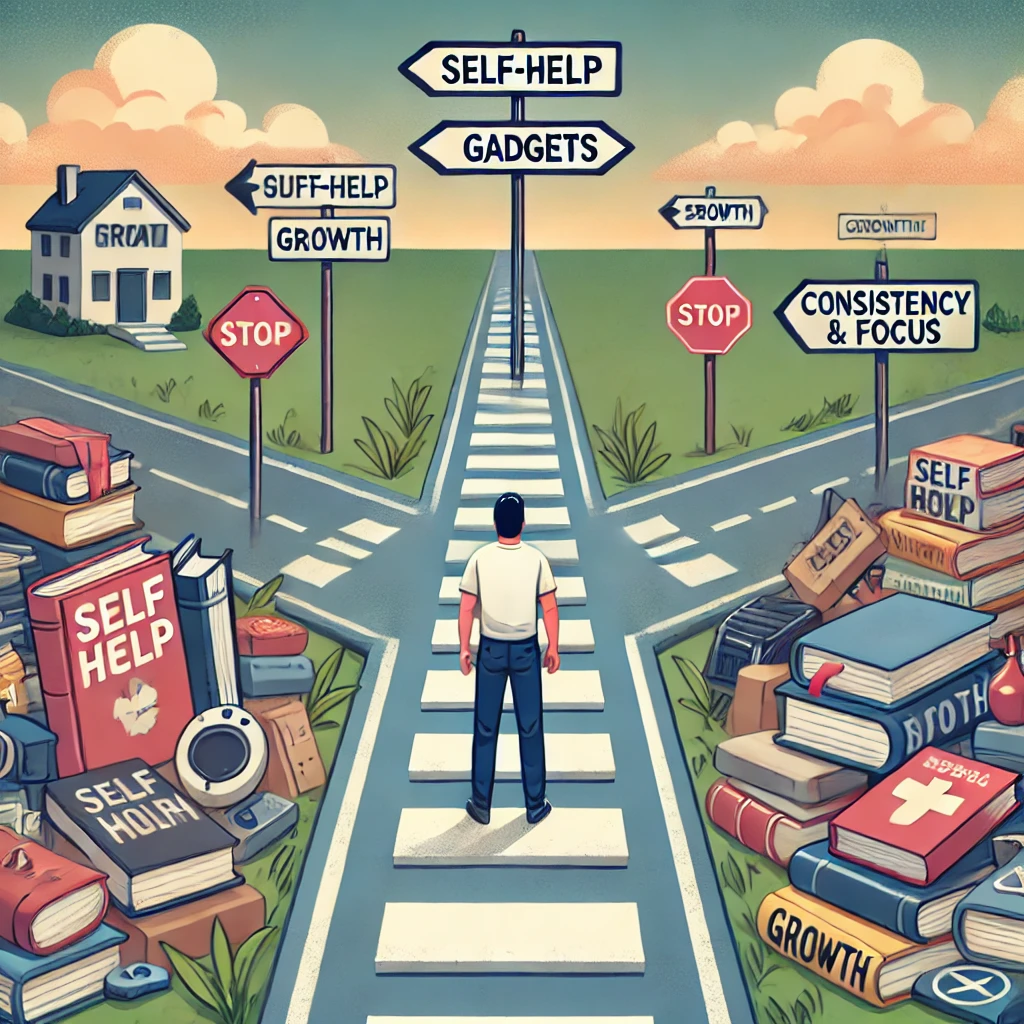You’ve probably heard it a hundred times: “You need to focus on personal development.” But let’s be honest for a second—how are you supposed to focus on personal growth when life is already moving a million miles an hour? Between work, family, and the constant barrage of new trends, it’s easy to feel like you’re barely keeping up, let alone growing.
Maybe you’ve caught yourself thinking, “Does it even matter? What if I’m just treading water while everyone else is swimming ahead?” It’s frustrating, isn’t it? You’re trying to make progress, but it feels like no matter what you do, the world just keeps speeding up. And the thought of adding one more thing—like learning a new skill or adopting a new habit—might just make you want to scream.
But here’s the thing: personal development doesn’t have to be overwhelming. It doesn’t mean reworking your whole life or keeping up with every trend. In fact, the small, consistent steps often make the biggest impact.
So, let’s cut through the noise and get real about what matters—and how you can actually make progress without burning out. Ready? Let’s begin.
Personal Development for Professionals — Staying Relevant Amid Rapid Change

It’s 2024, and the work landscape is shifting faster than we ever imagined. AI, automation, and tech advancements are reshaping industries overnight. It’s no wonder professionals feel the pressure to keep up. But here’s the thing: this isn’t just about learning new software or tools—it’s about adopting a mindset that allows you to stay adaptable, no matter what comes next.
Challenge: Feeling Outpaced by Technology
You might wonder, “How can I stay ahead when everything changes so quickly?” It’s easy to feel like you’re being left behind, watching others excel while you struggle to keep up. And the truth is, this feeling of falling behind is genuine for many. But here’s the counterintuitive part—you don’t need to master every new tool or technology. Instead, focus on developing a “learning mindset.”
Solution: Prioritize Lifelong Learning Over Perfection
Let’s break it down. Instead of feeling overwhelmed by every new tool or trend, focus on skills that never go out of style—like critical thinking, communication, and problem-solving. Yes, AI is changing things, but these human skills are what machines can’t replace. And the good news? You don’t need hours of your day to improve them.
Start small. Spend just 10–15 minutes each day learning something new. Whether reading an article, watching a TED Talk, or joining a short online course, these bite-sized learning sessions add up over time. If you’ve ever felt like you didn’t have time for personal growth, this strategy eliminates that barrier. It’s about consistency, not cramming.
Example: Microlearning for Busy Professionals
Take Lisa, a marketing manager who was always stressed about the latest AI tools in her field. She didn’t have time for lengthy courses but dedicated 10 minutes every morning to reading about emerging trends. Over six months, she found that she wasn’t just keeping up—she was contributing fresh ideas in her meetings, becoming the go-to person for insights on the future of marketing. Her secret? Consistency, not mastery. And that can be your secret, too.
Start today. Commit to just 10 minutes of learning each day. It doesn’t have to be groundbreaking. It just has to be something. Slowly, you’ll see how much you’ve grown without even realizing it.
Entrepreneurs — Innovating and Building Resilience in Uncertain Times

Running a business has never been easy, but in 2024, it can feel like navigating a maze with walls constantly shifting. Markets are volatile, customer expectations change quickly, and new competitors seem to pop up every other day. This uncertainty isn’t just a challenge for entrepreneurs—it’s the norm, and that can be exhausting.
Challenge: Pressure to Innovate While Avoiding Burnout
Every entrepreneur knows the pressure to innovate and be one step ahead. You’re expected to constantly develop new ideas while keeping your business afloat. But here’s the paradox: the more you push yourself to always be ahead, the more you risk burning out. Innovation without resilience is like running a marathon without water—you might start strong, but you’ll eventually hit a wall.
Solution: Building Resilience Through Small Wins and Reframing Setbacks
Resilience isn’t about being unbreakable—it’s about bending without breaking. It’s the ability to recover from setbacks quickly and keep moving forward. What is the best way to build this resilience? Break down your larger goals into smaller, more manageable pieces. When you focus on achieving small wins, you build momentum and confidence, which makes it easier to handle bigger challenges down the line.
And let’s talk about failure—something every entrepreneur dreads. But what if you could reframe failure as just part of the process? Instead of seeing setbacks as roadblocks, view them as detours leading you to a better path. Innovation doesn’t always come from success; it often comes from learning what doesn’t work.
Example: The Power of Small Wins
Consider Raj, an entrepreneur who launched a new app in the crowded fitness market. His first year was tough—constant glitches, low downloads, and sleepless nights. He felt like a failure. But instead of scrapping the whole idea, he focused on small improvements—fixing one glitch at a time, tweaking his marketing message, and getting feedback from his early users. Each small win boosted his morale, and eventually, his app gained traction. Raj realized that resilience wasn’t about pushing harder but pacing himself and celebrating progress along the way.
Take a moment today to reflect on your recent small wins. What have you accomplished, even if it seems minor? Let those victories fuel your next steps.
Students and Young Adults — Preparing for Jobs That Don’t Exist Yet

If you’re a student or a young adult, the future might feel like a giant question mark. You’re hearing a lot about the changing job market, but nobody can tell you exactly how. What will the world look like in five or ten years? What jobs will even exist? It’s easy to feel paralyzed when the path ahead seems so unclear.
Challenge: Uncertainty About Future Jobs and Skills
You’re probably asking yourself, “How can I prepare for a job when I don’t even know what that job will be?” It’s a fair question—and a frustrating one. There’s pressure to make the “right” decisions now, to choose the right major, internship, and the right skills. But here’s the counterintuitive truth: you don’t need to know the exact job you’ll have in the future. Instead, focus on learning how to learn.
Solution: Focus on Adaptable Skills and Lifelong Learning
In a world where industries are shifting, and new technologies are emerging, the best skill you can develop is adaptability. Instead of specializing too early, focus on building a diverse skill set. Skills like critical thinking, creativity, and emotional intelligence will serve you well regardless of the job market. These are the skills that robots can’t replicate, and they’ll make you stand out no matter what industry you end up in.
And let’s talk about lifelong learning. The days of “getting a degree and being done” are over. The most successful people are those who keep learning—whether it’s through online courses, mentorship, or just reading widely. You don’t have to have it all figured out right now. Just keep growing, and the right opportunities will find you.
Example: Learning How to Learn
Consider Sarah, a college student who started studying journalism but quickly realized the traditional job market for reporters was shrinking. Instead of panicking, she focused on building transferable skills like communication, digital marketing, and data analysis. She also made it a habit to take short online courses in areas like graphic design and podcasting. By the time she graduated, she wasn’t limited to journalism—she was equipped to work in marketing, media, or even tech. Her ability to learn became her biggest asset.
If you’re feeling overwhelmed by the future, take a deep breath. You don’t have to have all the answers. Focus on developing the skills that will carry you through any career, and remember adaptability is your superpower.
Self-Improvement Enthusiasts — Overcoming Overwhelm and Staying Consistent

You’re always on the hunt for ways to improve yourself. Maybe it’s through books, podcasts, or courses. And while that drive to grow is admirable, it can also feel like you’re swimming in a sea of information, unsure of which direction to go. You’ve likely faced the all-too-common feeling of being overwhelmed—where there’s so much to learn but not enough time to do it all.
Challenge: Feeling Overwhelmed by Information and Struggling with Consistency
With countless articles, podcasts, and courses out there, it’s easy to fall into the trap of overconsumption—where you’re constantly learning but never really doing. You might think, “Am I even improving, or am I just spinning my wheels?” The answer lies in this: personal growth is about progress, not perfection. The key isn’t to absorb every piece of information; it’s to act on what resonates most with you.
Solution: Focus on One Area at a Time and Build Consistent Habits
Instead of trying to master everything at once, start with just one area of self-improvement. Whether it’s emotional intelligence, communication skills, or mindfulness, choose a focus and dedicate time to it consistently. This focus will bring clarity and help you avoid the scattered feeling of trying to do it all.
Equally important is building a habit around your personal development. Consistency beats intensity every time. If you dedicate even 10 minutes a day to your chosen area, you’ll see meaningful progress over time. Think of it like planting a tree—it won’t grow overnight, but with consistent care, it’ll flourish.
Example: The Power of Focused Growth
Meet James. He used to bounce from one self-improvement trend to another—one week, it was meditation; the next, it was productivity hacks. But he felt like he was going in circles. So, he decided to focus on one thing: emotional intelligence. Every day, he read for 10 minutes on the topic and practiced active listening with his colleagues. After a few months, James noticed something remarkable—his relationships improved, and he found himself handling stress better. Focusing on just one area made more progress than he had when chasing everything.
If you’re feeling like you’re drowning in information, it’s time to simplify. Pick one area of growth and commit to small, daily actions. It’s not about how much you learn but what you do with what you learn. Ready to dig deeper?
Parents and Educators — Balancing Growth with Responsibilities

If you’re a parent or educator, you’re probably juggling a million things—work, family, commitments—and personal development often gets pushed to the back burner. Feeling guilty about taking time for yourself is easy when so many people depend on you. But here’s the truth: taking care of your personal growth isn’t selfish—it’s essential. When you’re thriving, those around you thrive, too.
Challenge: Guilt and Overwhelm from Balancing Multiple Roles
You’ve probably felt the tug between wanting to invest in your growth and feeling like there’s no time for it. Maybe you think, “How can I focus on myself when I have a family to care for or students to guide?” It’s a common struggle. But here’s a mindset shift: when you prioritize your growth, you become a better role model for those around you. The best way to teach your kids or students about resilience, learning, and balance is to live those values yourself.
Solution: Integrating Personal Development Into Daily Life
The good news is personal development doesn’t have to be a separate task that takes hours of your day. Instead, it can be woven into your everyday routines. You can learn alongside your kids or students, share insights from your growth journey, or even practice mindfulness together. It’s about making small adjustments rather than radical changes.
Let’s say you’re working on stress management. One of the best ways to show your children or students how to handle pressure is to model it yourself. Take five minutes for a breathing exercise before you start your day, or introduce a family habit of practicing gratitude together at the dinner table. These small actions don’t just benefit you—they create a ripple effect, influencing those around you.
Example: Learning Together as a Family
Consider Emma, a mother of two and a high school teacher. She always felt guilty about taking time for herself, but she decided to change things up one day. Instead of working on her mindfulness practice in isolation, she invited her kids to join her for five minutes of morning meditation. Not only did it help her stay centred, but her kids also started picking up the habit. They became calmer, and the mornings at home went more smoothly. Emma realized that by prioritizing her growth, she was actually helping her family thrive.
Don’t see your personal development as something that steals time from your family or work—it can be part of it. Start by integrating small habits into your day, and see how they benefit both you and the people around you.
Common Challenges Everyone Faces — Information Overload, Time Constraints, and Accountability

No matter who you are—professional, entrepreneur, student, or parent—there are a few universal challenges regarding personal development. Feeling like you don’t have enough time, being overwhelmed by all the advice out there, and struggling to stay accountable are problems everyone faces at some point.
Challenge: Feeling Overwhelmed by Information and Struggling with Time Management
You’ve likely been there—starting one course, then abandoning it for another because you heard it’s better, all while feeling like you don’t have enough hours in the day to really dedicate to anything. Information overload is accurate, but it can also be paralyzing. The truth is, more isn’t always better when it comes to self-improvement. Consistency with a few essential practices will get you further than chasing every new trend or technique.
Solution: Simplify and Focus on What Matters Most
Here’s a simple fix: choose one area to focus on and block off a specific, manageable amount of time each day or week. It could be as little as 10 minutes, but make it a non-negotiable part of your routine. Whether it’s developing leadership skills, improving emotional intelligence, or mastering time management, focus on what will make the biggest impact on your life. Once that area becomes a habit, you can move on to the next. You don’t need to do everything at once to make progress.
As for accountability? Find a partner, a mentor, or even an online group to help keep you on track. It’s much easier to stay committed when someone else knows your goals and checks your progress. It might seem like a small step, but it can make a world of difference in staying consistent.
Example: Time Management and Accountability in Action
Let’s talk about Ben, a professional who was overwhelmed by all the self-improvement advice out there. He wanted to improve his public speaking, sharpen his leadership skills, and learn a new language. But every time he started one, he abandoned it when something new came along. Eventually, he decided to simplify—he focused just on public speaking, setting aside 15 minutes a day to practice, and asked a colleague to hold him accountable. Within a few months, Ben became much more confident in his presentations. He made real progress by narrowing his focus and committing to a routine.
Take a step back if you struggle to juggle all the advice and expectations around personal development. Simplify. Focus on one area, set a routine, and find someone to help keep you accountable. You’ll be amazed at your progress when you stop trying to do everything at once.
The Common Thread — Personal Development Is for Everyone

Whether you’re a professional trying to stay ahead, an entrepreneur facing constant uncertainty, a student preparing for the unknown, or a parent balancing life’s demands, personal development is the key to thriving—not just surviving—in 2024. But here’s the secret: it’s not a one-time project; it’s a lifelong process.
Challenge: Viewing Personal Development as a “Finish Line”
Too often, people see personal growth as a checklist—something to be completed and then set aside. Maybe you think, “Once I finish this course, read this book, or reach this milestone, I’ll be done.” But here’s the truth: personal development isn’t something you ever really “finish.” In fact, the moment you stop growing is when you start to fall behind. The world keeps moving, and so should we.
Solution: Embrace Lifelong Learning and Resilience
The best way to navigate this constantly evolving landscape is to adopt a mindset of lifelong learning. Keep asking questions, stay curious, and continue improving, even in small ways. Set meaningful goals—not just for the short term but also for the long term. Your goals might shift as life changes, but having something to aim for will keep you focused and motivated. Along the way, you’ll build mental toughness, overcoming setbacks and moving forward.
Example: The Power of Mental Toughness
Think of Lucy, a middle-aged professional who had reached a plateau in her career. She assumed her growth days were behind her, thinking, “I’ve learned everything I need to know.” But then her company introduced new technology she wasn’t familiar with. Instead of resisting the change, Lucy decided to embrace it. She took online courses, asked younger colleagues for help, and set a personal goal to master the new system. It wasn’t easy, but she not only adapted but thrived through persistence. Her mindset of continuous learning made her a more resilient, confident professional.
Personal development is an ongoing journey, not a destination. So, what’s next for you? Whether you’re just starting or you’ve been on this path for years, there’s always more to learn and more ways to grow. Start by setting meaningful, realistic goals, and don’t shy away from setbacks—they’re just part of the process.
Your Journey to Growth Starts Now
Maybe you’ve thought, “This all sounds great, but where do I begin?” It’s normal to feel a little overwhelmed—after all, personal development can seem like just one more thing to add to your already full plate. You might even feel a bit stuck, questioning whether these changes will make a difference.
But here’s the thing: you don’t have to do it all at once. Personal growth isn’t about transforming overnight or becoming perfect. It’s about taking that first small step and then another, and another. The path to becoming your best self is a journey—and you’re already on it, just by reading this far.
Remember all we’ve explored together: how professionals can stay ahead in a world of rapid change, how entrepreneurs can innovate and build resilience, how students can future-proof their careers, and how parents can lead by example. We’ve broken down the overwhelm, shown how little actions add up, and highlighted the power of consistency.
You can do this. Each of these strategies, each of these small steps, is within your reach. You don’t need to master everything today—just commit to growing a little every day. The benefits are life-changing: resilience, adaptability, focus, and the ability to thrive no matter what the world throws at you.
Now’s your time. You’ve got the tools, the insight, and the drive. What’s left? The action. Take it. You’re not just moving forward—you’re becoming the person you’re meant to be. And trust me, the journey ahead is brighter than you think.
So let’s go. Start today because the best version of you is just around the corner—waiting.